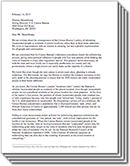Over 200 organizations ask Census Bureau to develop solutions to “prison gerrymandering”
210 civil rights, voting rights and criminal justice organizations sent a letter calling on the U.S. Census Bureau to seize a timely opportunity to research alternative ways to count incarcerated people in the decennial Census.
February 14, 2013
FOR IMMEDIATE RELEASE: FEBRUARY 14, 2013
Contact:
Leah Sakala, Prison Policy Initiative, (413) 527-0845
Lauren Strayer, Dēmos, Lauren Strayer, (212) 389-1413
Easthampton, MA – Today, more than 200 civil rights, voting rights and criminal justice organizations sent a letter calling on the U.S. Census Bureau to seize a timely opportunity to research alternative ways to count incarcerated people in the decennial Census.
The letter expresses a national concern that the Bureau’s method of counting incarcerated people at prison locations, rather than in their home communities, leads to an unequal distribution of political power in state and local governments known as “prison gerrymandering.” The letter explains that incarcerated people are not considered residents of prisons for other purposes, but the Census Bureau’s method “concentrates a population that is disproportionately male, urban, and African-American or Latino in approximately 1,500 federal and state prisons that are far from their home communities.” The 210 organizations wrote, “We are concerned that the Census Bureau’s tabulation procedures distort the redistricting process, giving extra political influence to people who live near prisons while diluting the votes of residents in every other legislative district.”
Although the 2020 Census is seven years away, the Census Bureau is already deep in the planning process. The letter calls on the Bureau to pave the way for a national end to prison gerrymandering in 2020 by prioritizing research on how to count incarcerated people at home in the next census. “In order to develop the best possible methodology for fixing prison gerrymandering, the Census Bureau needs to address this research question now,” said Brenda Wright, Vice President of Legal Strategies at Dēmos.
The letter charges that “…Failing to count incarcerated people at home for redistricting purposes undermines the constitutional guarantee of ‘one person, one vote’, with critical implications for the health of our democracy.” For that reason, the organizations note, four states and more than 200 counties and municipalities have made their own adjustments to Census Bureau data in order to avoid prison gerrymandering. But while state and local governments are increasingly devising their own solutions, many face unique constraints and only the Census Bureau can implement a comprehensive and standardized national solution.
The letter credits the Census Bureau with recognizing that prison gerrymandering causes significant problems for state and local redistricting. Specifically, the Bureau began to address the problem by releasing 2010 Census data on prison populations ahead of schedule in order to allow state and local governments to adjust their redistricting data to avoid prison gerrymandering. “The Bureau has made great progress towards enabling state and local governments to find creative solutions to prison gerrymandering,” said Peter Wagner, Executive Director of the Prison Policy Initiative, “and now the Bureau must use the current planning period to ensure that the 2010 Census is the last one to tabulate two million incarcerated people outside their home communities.“
The full text of the letter, including a list of signers, is available at http://www.prisonersofthecensus.org/letters/feb2013.html.





[…] Press release: “Today, more than 200 civil rights, voting rights and criminal justice organizations sent a letter calling on the U.S. Census Bureau to seize a timely opportunity to research alternative ways to count incarcerated people in the decennial Census.” This entry was posted in felon voting, redistricting. Bookmark the permalink. ← “Nate Silver defends contested post; His decision to omit outside spending still leads to an incomplete analysis” […]